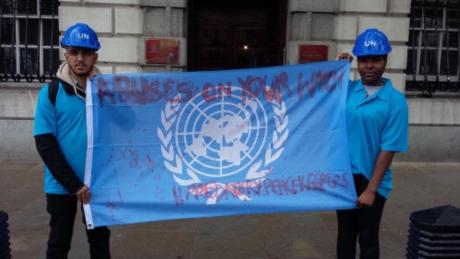As evidence of UN peacekeepers’ sexual violence against Black African women and girls grows, media reporting and research reinterprets this as ‘transactional sex’, through the logic of colonialism.
By Guilaine Kinouani. Published 11-25-2016 by openDemocracy

Photo:: Predatory Peacekeepers
A few months ago, the campaign #predatorypeacekeepers started on social media. It followed a report from a Canadian AIDS charity accusing UN and French troops in the Central African Republic (CAR) of sexually abusing at least 98 girls. The damning report alleged that three girls had been tied up and forced to have sex with a dog, that one of the victims subsequently died and that many of the abuses were orchestrated by a French General. Since publication, more victims have come forward. Many spoke of degrading sexual acts including soldiers urinating on the victim’s body or in her mouth.
Allegations of sexual misconduct by UN soldiers have been documented in most of the countries where UN peacekeeping troops serve. However, what seems striking in CAR is the alleged involvement of senior officers and the age of the victims. In December 2015, an Independent Panel produced scathing findings on the way the UN had responded to the allegations in CAR. It identified systematic failures and highlighted a culture of impunity, inadequate investigatory mechanisms and unsatisfactory structures to support victims. There has been no public update by the UN on the progress made in implementing the recommendations of the Panel. The few prosecutions have exclusively been of (Black) African Peacekeepers. White predatory peacekeepers, it appears avoid accountability. Continue reading

